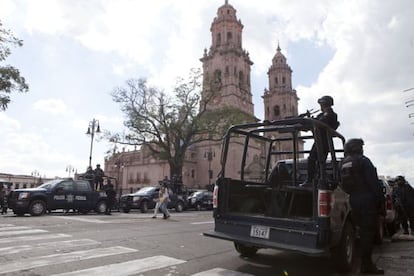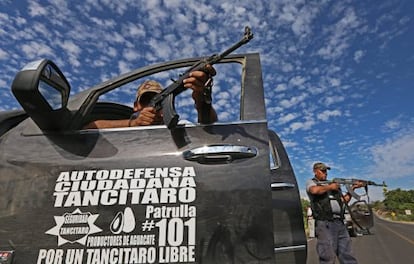Mexican troops move in to disarm vigilantes and regain control of towns
Self-defense forces vow to keep their weapons until drug cartel leaders are captured

The Mexican government on Monday night sent in the army to quell the violence in Michoacán state and disarm hundreds of vigilantes who have taken over at least 11 municipalities in their effort to rid the region from the tight grip of a powerful drug cartel.
But the effort by the government of President Enrique Peña Nieto has turned into a standoff with the self-defense forces vowing to resist the army’s disarmament until the leaders of the Los Caballeros Templarios cartel are detained.
“Our goal is to clean the region of Los Caballeros Templarios,” said Estanislao Beltrán, spokesman for the Tepalcatepecs – one of two vigilante groups leading the takeover of towns and cities in Michoacán.
Fighting between the vigilante groups and the drug cartel members has been fierce since the weekend when self-defense forces captured Nueva Italia, a city of about 30,000.
Tepalcatepec leader José Manuel Mireles denied in a video posted on YouTube that he had ordered his forces to disarm after Peña Nieto’s chief of staff, Miguel Ángel Osorio Chong, called on the armed citizens to lay down their weapons and return to their homes.
I have not authorized anyone to disarm”
Mireles’ video was posted just hours after he appeared in a newscast asking his members to accept the government’s offer just as federal troops launched their operation to regain control of at least two municipalities: Nueva Italia and Parácuaro. There was no immediate reason as to why he apparently changed his mind.
“I have not authorized anyone to disarm,” he said.
Mireles had been recovering at a heavily guarded hospital in Mexico City from injuries he sustained in a plane crash on January 5. But according to media reports he was taken to an undisclosed location.
Throughout the evening the vigilantes battled with unknown groups in clashes that left at least two people dead.
The self-defense forces emerged last February after citizens in Michoacán complained that local authorities were not protecting them from the abuses, such as kidnappings, extortions and rapes committed by Los Caballeros Templarios (The Knights Templar) in many towns and cities.
Just hours after Osorio Chong called on the forces to lay down their weapons and cede control of the towns they had taken, dozens of Hercules helicopters, with hundreds of soldiers on board, landed in Uruapan, the second most important city in Michoacán, to begin the operation.

“If the federal government makes a move and gives us the top leaders of Los Caballeros Templarios such as [Nazario Moreno] ‘el Chayo,’ [Servando Gómez] ‘la Tuta’ and [Enrique Plancarte] ‘el Quique,’ who are the ones responsible for the kidnappings, then will we see what we will do,” said Beltrán, spokesman for the Tepalcatepecs.
Hipólito Mora, who leads the La Ruana force, the other vigilante group in Michoacán, said that the state was being run “by organized crime,” and accused the protestors who have been burning buses and setting up road blocks outside towns under vigilantes control of being members of Los Caballeros Templarios. “We are hard-working, productive people,” he said of his self-defense comrades.
Michoacán has 113 municipalities, but the biggest are located in the Tierra Caliente region, where self-defense forces have been gradually taking control since last November. The state is a notorious center of marijuana and meth production, and is used as a transshipment point for cocaine headed to the United States. The state’s main port, Lázaro Cárdenas, on the Pacific coast, has been controlled by the army since last November.
Tu suscripción se está usando en otro dispositivo
¿Quieres añadir otro usuario a tu suscripción?
Si continúas leyendo en este dispositivo, no se podrá leer en el otro.
FlechaTu suscripción se está usando en otro dispositivo y solo puedes acceder a EL PAÍS desde un dispositivo a la vez.
Si quieres compartir tu cuenta, cambia tu suscripción a la modalidad Premium, así podrás añadir otro usuario. Cada uno accederá con su propia cuenta de email, lo que os permitirá personalizar vuestra experiencia en EL PAÍS.
En el caso de no saber quién está usando tu cuenta, te recomendamos cambiar tu contraseña aquí.
Si decides continuar compartiendo tu cuenta, este mensaje se mostrará en tu dispositivo y en el de la otra persona que está usando tu cuenta de forma indefinida, afectando a tu experiencia de lectura. Puedes consultar aquí los términos y condiciones de la suscripción digital.








































